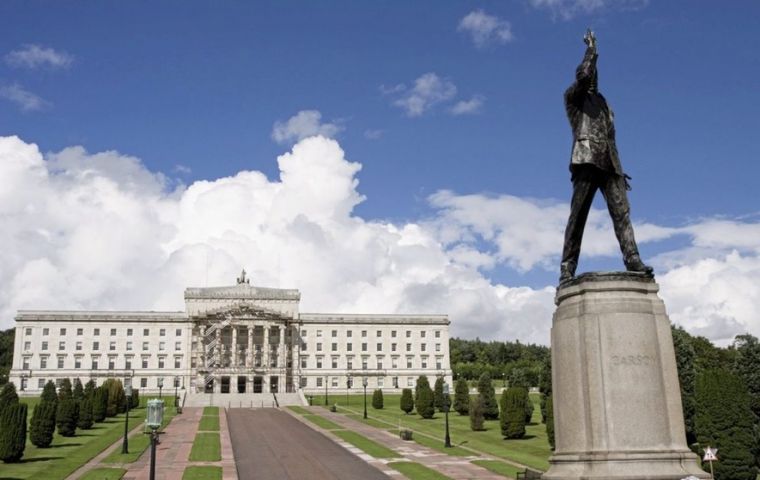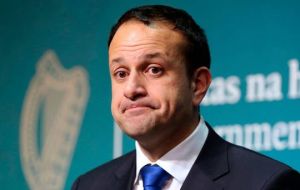MercoPress. South Atlantic News Agency
Dublin does not accept direct rule from London in North Ireland
 The Stormont executive collapsed at the start of 2017 after a bitter row between the DUP and Sinn Féin over a failed energy scheme.
The Stormont executive collapsed at the start of 2017 after a bitter row between the DUP and Sinn Féin over a failed energy scheme.  Leo Varadkar insisted that there would be only two options if talks fail; either to call Another assembly election, or convene the British-Irish Conference BIGC
Leo Varadkar insisted that there would be only two options if talks fail; either to call Another assembly election, or convene the British-Irish Conference BIGC The Irish government would expect to have a “real and meaningful involvement” in Northern Ireland if efforts to restore Stormont fail, the Irish prime minister has said. Leo Varadkar said he would not support a return to direct rule from London if time is called on talks to restore a power-sharing government in Belfast, and anticipated he would make a fresh bid for a deal in January.
Northern Ireland has been without a government for almost a year. The Stormont executive collapsed at the start of 2017 after a bitter row between the DUP and Sinn Féin over a failed energy scheme. Several rounds of talks, and a fresh Assembly election, have failed to restore the power-sharing government.
Northern Ireland Secretary James Brokenshire has said that while the UK government does not want a return to direct rule, time is running out to restore devolution.
Leo Varadkar insisted that there would be only two options if talks fail; either to call Another assembly election, or convene the British-Irish Intergovernmental Conference (BIGC). The taoiseach (Irish prime minister) suggested he would seek the latter, adding that little would be gained from another snap election.
DUP leader Arlene Foster dismissed the group as a “talking shop”.
The BIGC is a bilateral body constructed out of the 1998 Good Friday Agreement, which brought to an end the 30 years of sectarian conflict in Northern Ireland known as The Troubles.
It brings together UK and Irish ministers to encourage co-operation on matter of mutual interest in Northern Ireland, and last met in 2007.
Unionists have insisted that the UK government would be in sole charge of the region if there is direct rule and that there will be no joint authority between the UK and Irish governments over Northern Ireland.
Responding to Mr Varadkar's statement, the DUP said it would not be acceptable for the Irish government to be involved in Northern Ireland's internal affairs.
“It would be a fundamental breach of all the agreements we have reached,” DUP MP Jeffrey Donaldson told the BBC's Good Morning Ulster program. “Matters internal to Northern Ireland are a matter for the UK government and NI parties alone.”
Mr Varadkar said he would not characterise the Republic's potential role as a form of “joint rule”, acknowledging legislative authority rested with Westminster, but he said his government should have significant involvement.
“Essentially the Good Friday Agreement provides for matters that are not devolved to be dealt with by the British-Irish governmental conference and that's what we will seek,” he said.
“We won't be supporting direct rule. We didn't support direct rule.
”So the alternative to the assembly and the executive being up and running is either a) an election, or b) convening the British-Irish governmental conference, and that's what we'll seek, and I should point out that is what the Good Friday Agreement says.
“So all we'd be seeking is the implementation of the Good Friday Agreement which, as you know, is an international agreement between two governments endorsed by referendum in both parts of the island.”
Asked if he envisaged a form of joint rule, the taoiseach said: “I wouldn't use the term 'joint rule', because that's not the term used in the Good Friday Agreement.
”The Good Friday Agreement speaks of a British-Irish governmental conference which is not joint rule because obviously the legislative powers remain at Westminster, but it does involve real and meaningful involvement of the Irish government,” he added.
Mr Varadkar said he and his deputy Simon Coveney hoped to meet Stormont's political leaders next month to discuss a return to power-sharing.




Top Comments
Disclaimer & comment rules-

-

-

Read all commentsVoice/Capt R
Dec 24th, 2017 - 11:44 am +1As a citizen of the Republic of Ireland I entirely agree, it is nothing to do with Dublin and the idiots in Brussels/Strasbourg or wherever they are next week.
Varadkar is just trying to make a name for himself as he is afraid that if he doesn't then Sinn Fein will roll him in the sand.
Not to mention the fact that he is terrified of the EU allowing beef imports from SA and then having to use Ireland's veto as he thinks the Brussels Junta will then see Ireland as 'bad Europeans' and we would have to go and stand on the naughty step along with the UK, Portugal, Spain, Italy, Greece, Cyprus and everyone else who has incurred the wrath of these megalomaniacs.
The choice is really Northern Ireland's, I don't see what it has to do with Dublin...
Dec 23rd, 2017 - 07:37 pm 0Northern Ireland is not a part of the Republic...
Dublin has no say in the matter neither does the EU.
Dec 24th, 2017 - 06:23 am 0Commenting for this story is now closed.
If you have a Facebook account, become a fan and comment on our Facebook Page!